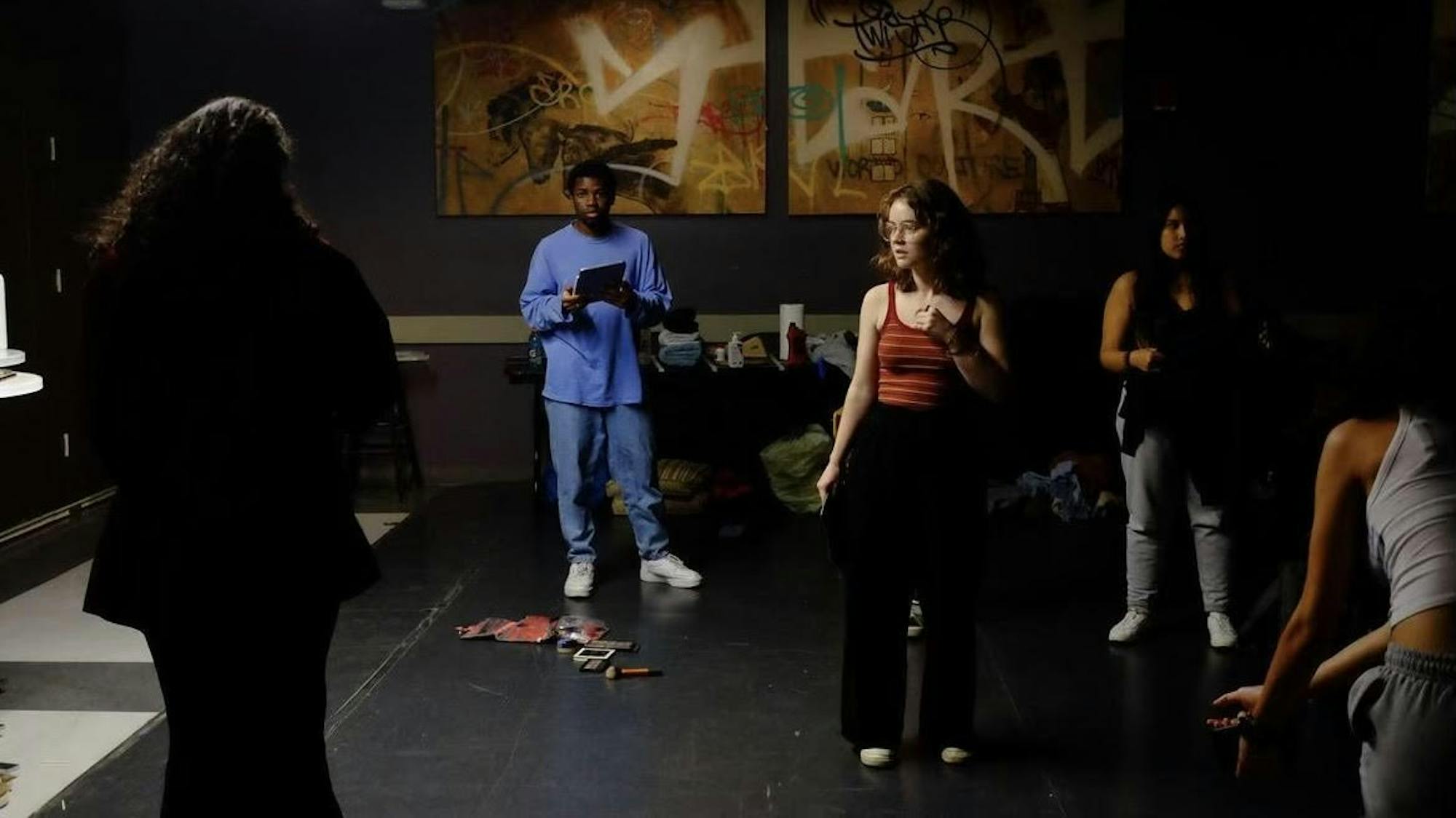In a tight-knit community like Dartmouth, student-led theater groups can explore powerful thematic narratives that embody student interests. Using theater as their medium, student performers instigate change and awareness among the student body. Two student groups on campus, the Displaced Theatre Company and the Dartmouth Rude Mechanicals, put on termly productions portraying stories that the campus community might otherwise not see.
Maggie MacDonald ’23 is the director of Displaced Theatre Company’s spring production of “The Antipodes,” which they will perform on Sunday, May 14. “The Antipodes,” a 2018 play written by Annie Baker, is a dark comedy about storytelling. According to MacDonald, the thematic question of the show focuses on “what stories are worth telling, and how do we tell those stories.”
Assistant director Lucas Filippone ’26 said this question highlights the overall mission of Displaced as a contemporary student-run theater troupe. He said that most of the subjects touched upon across Displaced productions are “on topics that the [theater] department would not be as likely to do –– we cover a lot of heavy stuff,” such as abortion, sexual assault and workplace relationship dynamics.
Filippone explained why Displaced, a group that only produces works from the past 20 years, provides such an effective outlet for storytelling.
“The significance of such contemporary work maintains that the students are talking about what is important to them,” Filippone said.
Conor Roemer ’23, who plays Sandy in The Antipodes, echoed this sentiment, saying he connects with the play on an individual level.
“It’s about a bunch of writers who are brainstorming a story. They’re all sitting around in a circle, just telling random anecdotes and sharing their experiences,” Roemer explains. “It’s a commentary on what it means to tell a story and what the story signifies to the people who are part of it.”
Roemer said he thinks the overall plot of The Antipodes reflects the mission of Displaced, and demonstrates the significance of student theater, “because that's kind of what we’re doing.”
“We’re just students and kids, trying to play our hand at what it means to tell a story,” Roemer said.
MacDonald also cited the show’s capacity for in-depth character growth in each role, since most characters have a “substantial monologue.”
Ultimately, what makes participating in a student-led theater group so unique to Roemer is how every aspect of the production is managed by a student.
“All the lights, sound, stage combat — all of that is done by students, and obviously, all the acting is too,” he said. “So it’s definitely nice that we kind of get the flexibility and the independence to do what we want.”
While sharing the same student-led nature as Displaced, The Rude Mechanicals — Dartmouth’s oldest student-run theater troupe — contrasts the contemporary pieces from Displaced by focusing solely on Shakespeare. The Rude Mechanicals will perform Coriolanus on May 12 and 14.
Heather Damia ’24, company manager of Rude Mechanicals, describes how despite the fact that the troupe only performs Shakespeare, they still have “a lot of flexibility” due to the universal and timeless themes in Shakespeare’s texts.
“The director gets to decide which parts to keep, which roles to eliminate, what kind of staging or what kind of themes they want to emphasize,” Damia said. “I think there’s a lot of different ways you can shape Shakespeare to make it be something relevant today.”
According to Rude Mechanicals member Charlie Knight ’24, a theater company solely dedicated to Shakespeare is “definitely a rarity.”
“It’s just the quality of the language, the clarity of the storytelling, the sort of gaps in between the lines, where there’s so much to do as an actor to think about what a character is thinking and feeling and what you can do physically,” Knight added.
Knight said Shakespeare’s catalog is “a creative goldmine,” because there’s something for every type of story. “If you’re a director or an actor and you feel strongly about a certain story, you’ll almost assuredly find something that speaks to you.”
One of these ways is through costumes and visuals, which are another mode of expression in theatre, Damia added. She said the troupe likes to modernize costumes to make things interesting.
“We do a lot of just in terms of visually updating things, like we did Much Ado About Nothing in the 1950s. We also did our last production, the History of King Richard the Second, dressed very modern,” Damia said. “There’s a lot of suit jackets that conveyed a bit of corporate or political energy there.”
Damia said that the extent the Rude Mechanicals modernize older plays goes beyond costume design. According to Damia, the Rude Mechanicals have switched up the genders of the characters in their shows to illuminate current discussions about gender inequalities.
Damia also added that the collaboration of the Rude Mechanicals is what makes the atmosphere of their shows so special.
“The ability to perform in Shakespearean productions that are modernized, or specifically meant for modern audiences, allows for a lot of room to build characters and build in themes, whether or not they were placed there to begin with,” she said.
Knight encouraged students to see Coriolanus, their upcoming spring production. Despite not being contemporary work, he said he believes that these specific types of stories need to be told.
“Knowledge about humanity, and how people act, and how society composes itself, it’s evident that society really isn’t all that different from 500 years ago,” Knight added.




